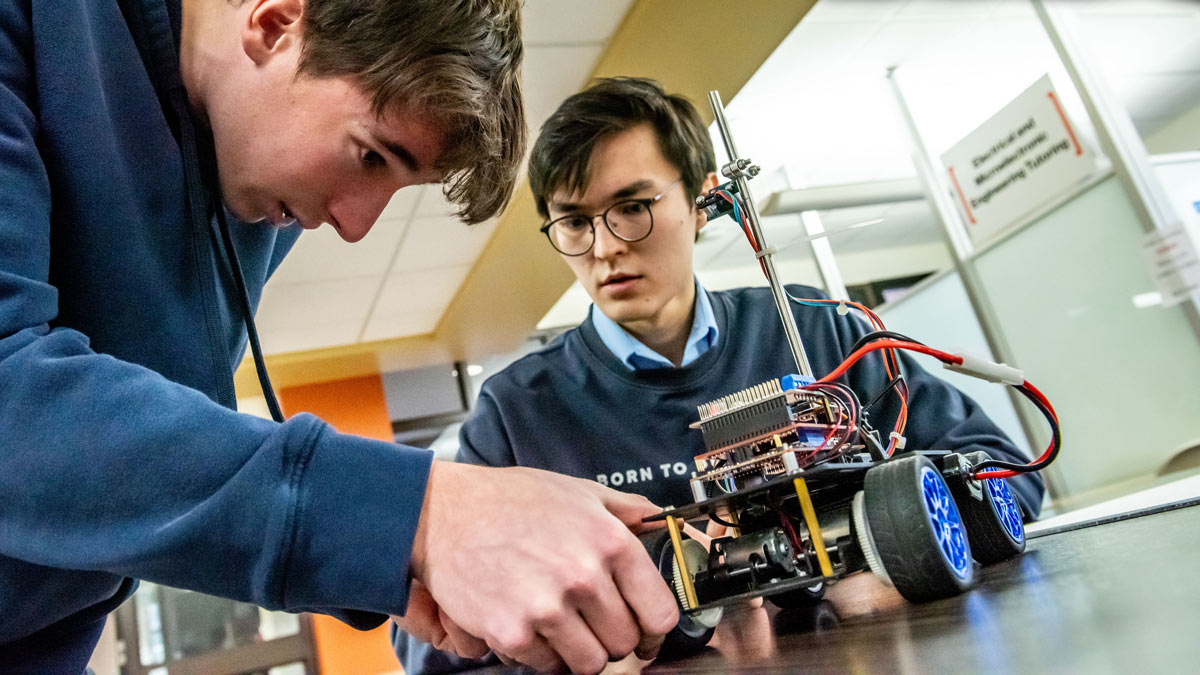Computer Engineering Option - Electrical Engineering BS

Computer Engineering Option
Electrical Engineering BS
- RIT /
- Rochester Institute of Technology /
- Academics /
- Computer Engineering Option - Electrical Engineering BS
RIT’s Computer Engineering option in Electrical Engineering BS will provide skills to ensure devices such as laptops, smartphones, autonomous cars, and cardiac pacemakers function efficiently.
Overview for Computer Engineering Option - Electrical Engineering BS
Why Study Computer Engineering at RIT?
Advanced Electives: Gain a deep understanding of computer engineering as it relates to electrical engineering.
Senior Project: Work on an exciting design project that focuses on embedded systems.
STEM-OPT Visa Eligible: The STEM Optional Practical Training (OPT) program allows full-time, on-campus international students on an F-1 student visa to stay and work in the U.S. for up to three years after graduation.
Smartphones, laptops, autonomous cars, cardiac pacemakers, blood pressure monitors, and more. These devices all embed computing systems into electrical components. And these systems require an electrical engineer with an understanding of computer engineering to help make them function efficiently.
This option is part of the electrical engineering BS program.
Computing Engineering BS vs. Computer Engineering Option
What’s the difference between the computer engineering BS degree and the computer engineering option in electrical engineering BS degree? Learn more about the similarities and the differences between these two closely related fields.
Students in the computer engineering option of the electrical engineering BS learn to design using hardware description languages, verify through simulation, and physically implement and test custom digital circuits and systems, including computer systems. Furthermore, they learn how to configure and use analog and mixed-signal circuits. All of these are essential components of microcontrollers, which in turn are used in application-specific and embedded systems. Great emphasis is placed on the hardware-software interface through the coverage of high-level and assembly programming languages in the two computer programming courses they take, which are tailored toward electrical engineering. In addition, they will study digital signal processing, radiation and propagation, power electronics, control systems, communications, circuit theory, computer architecture, computer-aided design, embedded systems, solid-state devices, microelectromechanical systems (MEMs), and robotics.
Computer Engineering Option in Electrical Engineering BS
Students in the computer engineering option of electrical engineering BS learn how to:
- Design using hardware description languages
- Verify through simulation
- Physically implement and test custom digital circuits and systems, including computer systems
- Configure and use analog and mixed-signal circuits
Great emphasis is placed on the hardware-software interface through the coverage of high-level and assembly programming languages in the two computer programming courses required, which are tailored toward electrical engineering.
In addition, you will study:
- Digital signal processing
- Radiation and propagation
- Power electronics
- Control systems
- Communications
- Circuit theory
- Computer architecture
- Computer-aided design
- Embedded systems
- Solid-state devices
- Microelectromechanical systems (MEMs)
- Robotics
Advanced Elective Courses for Computer Engineering Option in Electrical Engineering BS
The computer engineering option includes advanced elective courses designed to provide a depth of understanding in computer engineering as it relates to electrical engineering. You’ll take courses in:
- Digital systems
- Embedded systems design
- Design of digital systems
- Design of computer systems
Multidisciplinary Senior Design
Multidisciplinary Senior Design is a two-course sequence in your final year of study. It’s a capstone learning experience that integrates engineering theory, principles, and processes within a collaborative team environment. Multidisciplinary student teams follow an engineering design process, which includes assessing customer needs, developing engineering specifications, generating and evaluating concepts, choosing an approach, completing systems and subsystems designs, and implementing the design to the extent feasible, for example by building and testing a prototype or implementing a chosen set of improvements to a process. You’ll apply the knowledge you have learned in the classroom and from your co-op experiences to this design project. Students in the computer engineering option are expected to work on a design project that focuses on embedded systems.
-
#57 Best Engineering Undergraduate Programs, 2026
RIT’s engineering majors are ranked among the Best Undergraduate Engineering Programs in the nation.
-
Join Us for Accepted Student Open House
Visit campus on March 28 or April 11 to meet faculty, tour campus, and ask your questions.
-
First-Year Applications Due Soon
Apply by Jan. 1 for Early Decision II and by Jan. 15 for Regular Decision.
Careers and Cooperative Education
Cooperative Education
What’s different about an RIT education? It’s the career experience you gain by completing cooperative education and internships with top companies in every single industry. You’ll earn more than a degree. You’ll gain real-world career experience that sets you apart.
Co-ops and internships take your knowledge and turn it into know-how. Your engineering co-ops will provide hands-on experience that enables you to apply your engineering knowledge in professional settings while you make valuable connections between classwork and real-world applications.
All engineering majors are required to complete four blocks (approximately 48 weeks) of cooperative education experience. For students in the clean and renewable energy option, your co-ops are expected to take place in companies that develop or design embedded systems, digital systems, electronics, or solid-state devices. A sampling of companies that hire RIT students in the computer engineering option for co-ops and for full-time employment include Intel, Advanced Micro Devices, Apple, Microsoft, IBM, Texas Instruments, Analog Devices, Syracuse Research Corporation, Raytheon, Applied Physics Lab at John Hopkins University, NASA’s Jet Propulsion Laboratory, Draper Labs, and many more.
Featured Work and Profiles
-
RIT Research Minute: DNA Computing
Amlan Ganguly DNA molecules and computing? RIT computer engineering department head, Amlan Ganguly and his research team are working to change DNA for more sustainable and effective computing.
Read More about RIT Research Minute: DNA Computing
Admissions and Financial Aid
This program is STEM designated when studying on campus and full time.
This option is part of the electrical engineering BS. Please visit the degree program page for admission requirements.
Financial Aid and Scholarships
100% of all incoming first-year and transfer students receive aid.
RIT’s personalized and comprehensive financial aid program includes scholarships, grants, loans, and campus employment programs. When all these are put to work, your actual cost may be much lower than the published estimated cost of attendance.
Learn more about financial aid and scholarships
Contact
- Ferat Sahin
- Department Head
- Dean’s Office
- Kate Gleason College of Engineering
- 5854752175
- feseee@rit.edu
Department of Electrical and Microelectronic Engineering














